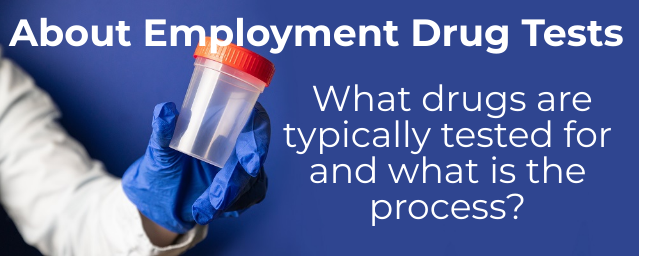- Home
- Employment Tests
- Pre Employment Drug Testing
Pre Employment Drug Testing - Questions and Answers
Pre employment drug testing is becoming a more and more common hiring requirement. It is estimated that 98 percent of Fortune 200 companies have implemented some form of employee drug testing during their recruitment process.
It is important to be prepared for these drug tests by knowing what to expect.
We answer your questions about drug testing for employment purposes.
Do you know what the pre-employment drug testing process involves? You can find out in detail at employment drug screening
10 common questions about pre employment drug testing
1. Is employment drug testing legal?
Most employers have fairly wide latitude when it comes to pre employment drug tests and the current emphasis on drug free workplaces encourages this.
- Each state has its own laws governing employment drug testing which employers should follow.
- Generally these allow for drug testing of job applicants provided the applicants know that the testing is part of the hiring process for all employees.
- Some states require a formal conditional offer of employment be given to the applicant before testing can take place.
- Often notification of pre employment drug testing is given on the application form which the candidate signs.
- Sometimes separate specific notification is given at the first interview.
2. What about the job applicant's rights to privacy, can pre employment drug tests be supervised or observed?
The US Supreme Court has held that both blood and urine collection are minimally intrusive and not harmful to job applicants when conducted in the right environment (workplace or collection facility) without direct observation by the tester.
- In other words it would likely be considered an invasion of the candidate's privacy if the employer required a urine sample while other people were in the room watching or the employer insisted on supervising the process. Various judgments have stated that employees have a legitimate expectation of privacy when urinating and direct observation by a stranger is highly intrusive.
- It is unlikely to be considered to be an invasion of privacy if a test administrator observes a candidate taking a saliva swab.
- However some courts have held that if there is a worry about tampering with the sample the employer may be allowed to have one person of the same sex as the candidate present when the sample is given. Other safeguards that may be enforced include listening to an employee urinate and checking the temperature of the urine
- A drug test result may be considered personal health information and there may be restrictions on how and whether such information can be shared.
3. What other rights does the applicant have with regard to the drug testing process?
The applicant's basic rights extend primarily to the right to privacy as stated above and the right to question the legitimacy of the test result including the right to pay for further testing at a lab of their choice.
You may have additional rights depending on your individual circumstances as well as State regulations.
4. Are all job applicants for the company tested for drugs?
Discrimination can be implied if an employer tests only certain applicants for a position.
- An employer cannot pick and choose which applicants for the same position will be tested.
- However within a company employment drug testing may be required for only certain positions.
- The company would have to be able to justify this in terms of the job requirements and a written drug policy for the company should include this.
5. Must the prospective employer have the applicant's consent for a drug test?
If the employer tries to test an applicant in an underhand manner without the applicant's knowledge or consent this can cause legal problems.
For example an employer is not allowed to pick up strands of hair that an applicant has left on a chair back during the interview and use them as a sample for a drug test.
6. What happens if an job applicant refuses to be tested?
Most
companies include a clause in their pre employment drug testing
policies or in their notification of drug testing that specifies that a
refusal to be tested will be treated as a positive result and the same
criteria as a positive result will be applied to the applicant.
7. What happens if the applicant is not able to provide a urine sample at the time of the test?
A urine test is the most common form of pre employment drug testing. Usually the applicant will be asked to remain at the collection center and drink measured fluids until able to produce a sample.
However drug tests may also be performed through saliva, blood, or sweat tests. Hair testing is growing in popularity and has been accepted by courts as a legal way to test for drugs. Drug residue remains in hair for a much longer period of time than it does in urine.
8. What prescription drugs can interfere with the drug test and how is this dealt with?
Certain over the counter medications can interfere with accurate results. These include ibuprofen and ephedrine-based products. Most drug testing companies will ask the applicant in advance what medications they have recently taken. The applicant should list these carefully.
If the medication has compromised the result of the drug test the sample is automatically retested using a methodology that will identify the drug type.
The applicant can present a doctor's prescription for the medication that can be reviewed by the medical officer. Some medications will preliminarily test non-negative, but the confirmatory tests will rule out any non-illegal substances.
Employers cannot discriminate in their hiring practices based on an applicant's use of prescription medication for legitimate medical purposes. Such discrimination could be a violation of the Americans with Disabilities Act.
9. Can applicant's "beat" the drug tests?
Certain internet sites give advice on how to supposedly dilute or adulterate urine samples. Most of these suggestions do not work and are easily identified in the testing process.
Even if the specific drug is successfully masked the product or method of tampering itself can be detected.
The best way to pass a drug test is to make sure you don't have drugs in your system
10. What about legal marijuana and pre employment drug testing?
This is a complex issue because the federal government has not legalized marijuana although some states have legalized medical and recreational use. Research your state's and the employer's drug testing policy to understand the consequences of marijuana use.
Pre employment drug testing
has become an accepted part of the final hiring decision. It is
important to know what this means for job applicants. Find out more
details about common employment drug tests at employment drug testing and know what to expect.
Go to the pre employment testing page to find out about other frequently used employment tests and how to approach them.
Employment background checks
Find out what will be looked at in your employment background check
Certain employers are permitted to use the employment polygraph. Find answers to commonly asked questions about the use of pre-employment polygraph examinations.
Latest Update - Employment Drug Tests
Companies are increasingly using oral fluid testing which results in higher detection rates of marijuana use. This may be attributed to the fact that urine specimen collection is generally unobserved while oral fluid specimens are collected when the candidate swabs his or her mouth while directly observed by the test administrator.
Advances in oral fluid testing technology may be part of the reason for the jump in positive test results.
DISCLAIMER: The information provided here is for guidance purposes only and is not legal advice.


